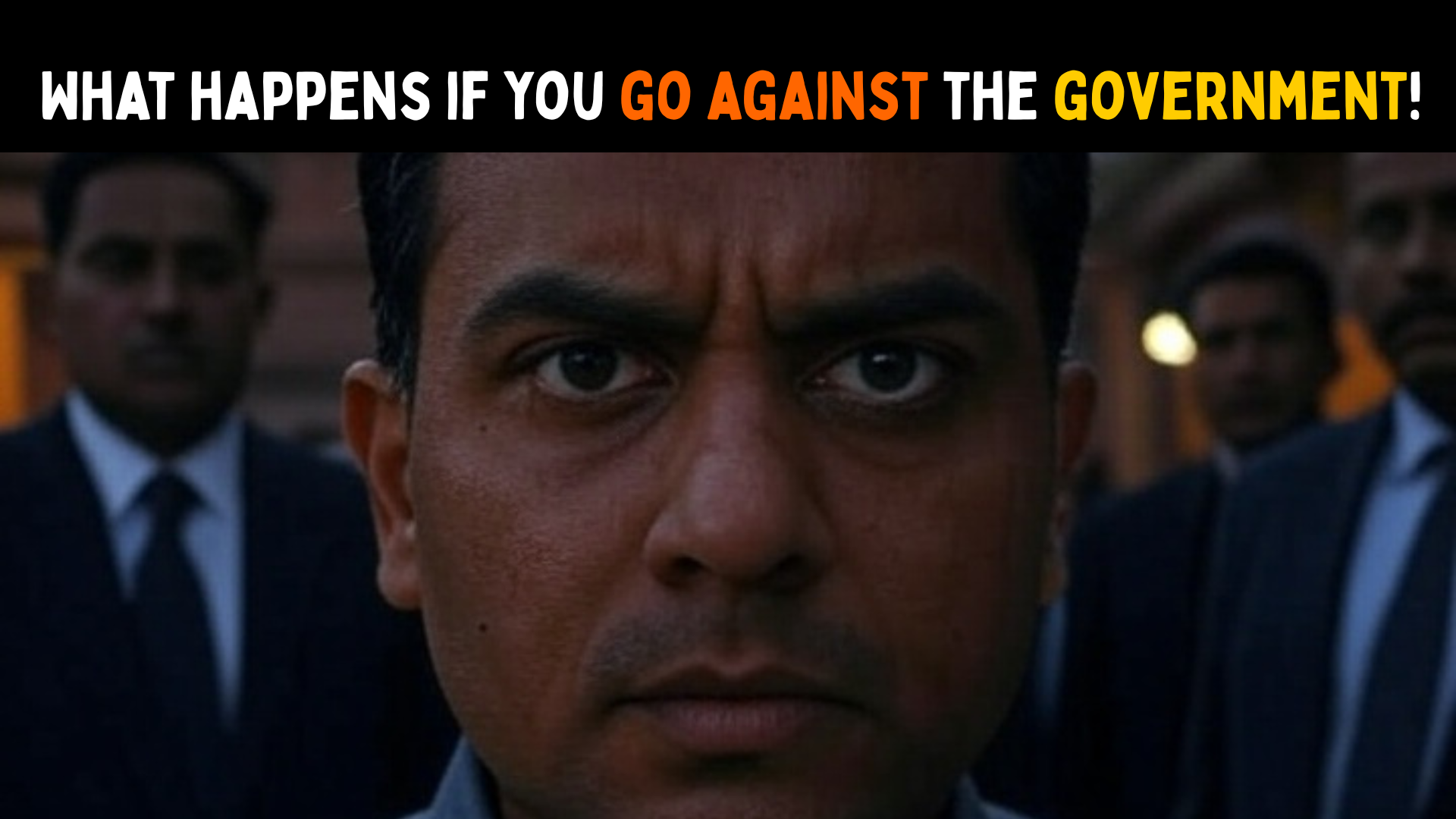In 2025, dissent in India means UAPA arrests, frozen accounts, raids, and media bans. Here’s what happens if you go against the government.
What Happens If You Go Against the Government in India?
Imagine standing in a crowded Delhi market in 2025, holding a placard that questions the government. Your heart races as you speak out, but what comes next?
In India today, opposing the government whether through protests, journalism, NGOs, or even a social media post can trigger serious consequences. From court cases to online trolling, and sometimes even jail, the risks are real.
So, what happens if you go against the government in India? Let’s break it down with the latest examples and verified facts.
Highlights
- Critics risk arrest under UAPA or face charges under the new Bharatiya Nyaya Sanhita (Section 152).
- 115 of 121 Enforcement Directorate probes since 2014 have targeted opposition leaders (Freedom House).
- Arvind Kejriwal, Rana Ayyub, Arundhati Roy, Savukku Shankar faced jail or charges in 2024–2025 (Human Rights Watch, Amnesty).
- 6,677 NGOs lost FCRA licenses between 2017–21, including Oxfam India (Freedom House).
- In 2025, 668 books banned in J&K, and journalists summoned for critical reports (Wikipedia, The Hindu).
- X users warn: “One tweet can land you in jail!” but dissenters still persist.
Legal Consequences of Dissent
- UAPA arrests: Critics like Arundhati Roy and Kashmiri academic Sheikh Showkat Hussain were charged in 2025 for “anti-national” speeches.
- State laws: Journalist Savukku Shankar was jailed under the Goondas Act for criticizing Tamil Nadu officials, freed only by Supreme Court order.
- New Sedition Replacement: Section 152 of the Bharatiya Nyaya Sanhita criminalizes acts against “sovereignty,” with life imprisonment as punishment.
- Targeted probes: 115 of 121 ED cases since 2014 went against opposition leaders; corruption charges often vanish when politicians switch to the BJP.
Financial and Institutional Crackdowns
- FCRA cancellations: Between 2017–2021, 6,677 NGOs including Oxfam India lost licenses for criticizing policies.
- In 2024, five more NGOs (including the Evangelical Fellowship of India) had licenses revoked.
- Opposition squeezed: Congress’s bank accounts were frozen before the 2024 election, crippling its campaign.
- Journalists raided: Investigative reporter Rana Ayyub continues to face money laundering charges first filed in 2022.
💡 Translation: Going against the government often means frozen funds, no grants, and endless court dates.
Social and Political Backlash
- Protests turn deadly: Demonstrations against the Waqf (Amendment) Act in Murshidabad (2025) left three dead.
- Targeted violence: Muslim minorities face vigilante attacks, often with little police intervention like the August 2025 Haryana killing over alleged beef eating.
- Political smears: Rahul Gandhi faced defamation suits after alleging Election Commission bias in 2025.
- Online trolling: X users often brand critics as “anti-national” or “traitors.”
People Also Reads : mp-vs-mla
Media and Digital Restrictions
- Media control: In 2025, the government banned Pakistan-linked YouTube channels and Instagram accounts after the Pahalgam attack.
- Book bans: 668 titles including works by Arundhati Roy were seized in J&K for “security threats.”
- Social media arrests: Even a single tweet (like the 2021 case about oxygen shortages in UP) can lead to jail time.
- Journalists harassed: Veteran reporters like Karan Thapar and Siddharth Varadarajan were summoned in 2025 under Section 152.
⚠️ Reality check: Digital India can mean surveillance India if you criticize too openly.
Real Stories of Resistance (2024–25)
- Arvind Kejriwal – Arrested in liquor policy case (Mar 2024), later released after protests.
- Sonam Wangchuk & Ladakh activists – 120 detained in Oct 2024 for demanding statehood rights.
- Mukesh Chandrakar – Journalist found dead in Jan 2025 after reporting on corruption.
- Arundhati Roy – Charged under UAPA for political speeches.
- Savukku Shankar – Detained under Goondas Act; freed by Supreme Court.
These stories show the cost of dissent but also that many continue to resist, from Delhi to Ladakh.
FAQs
1. What happens if you go against the government in India?
You risk UAPA charges, FCRA cancellations, ED raids, or social backlash.
2. What laws are used against critics?
UAPA, Bharatiya Nyaya Sanhita’s Section 152, and the FCRA.
3. Can social media posts lead to arrest?
Yes. Tweets and posts have triggered cases, including a 2021 arrest over oxygen shortage posts.
4. Who faced consequences in 2025?
Arundhati Roy, Savukku Shankar, Arvind Kejriwal, and several journalists.
5. Is dissent safe in 2025?
Not entirely critics face jail, raids, and harassment. Yet voices like Sonam Wangchuk and student groups still persist.



